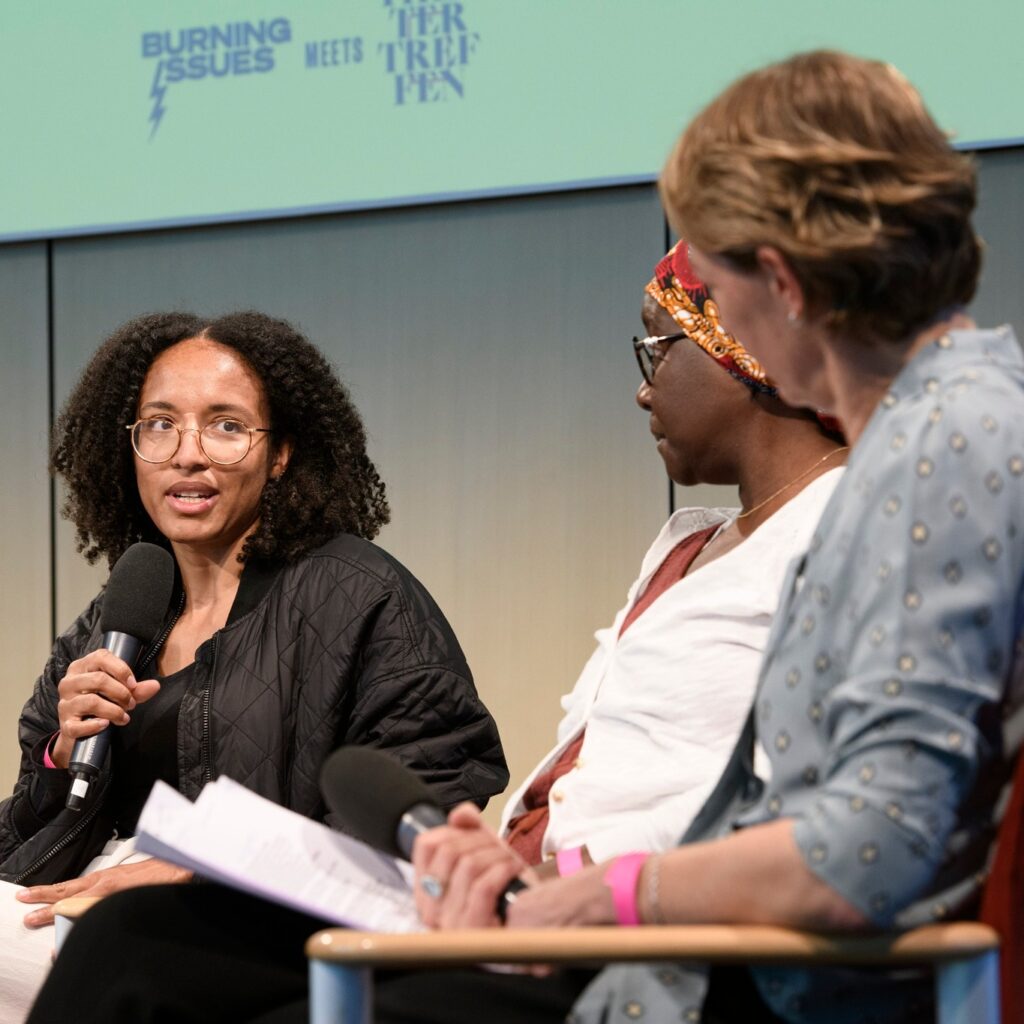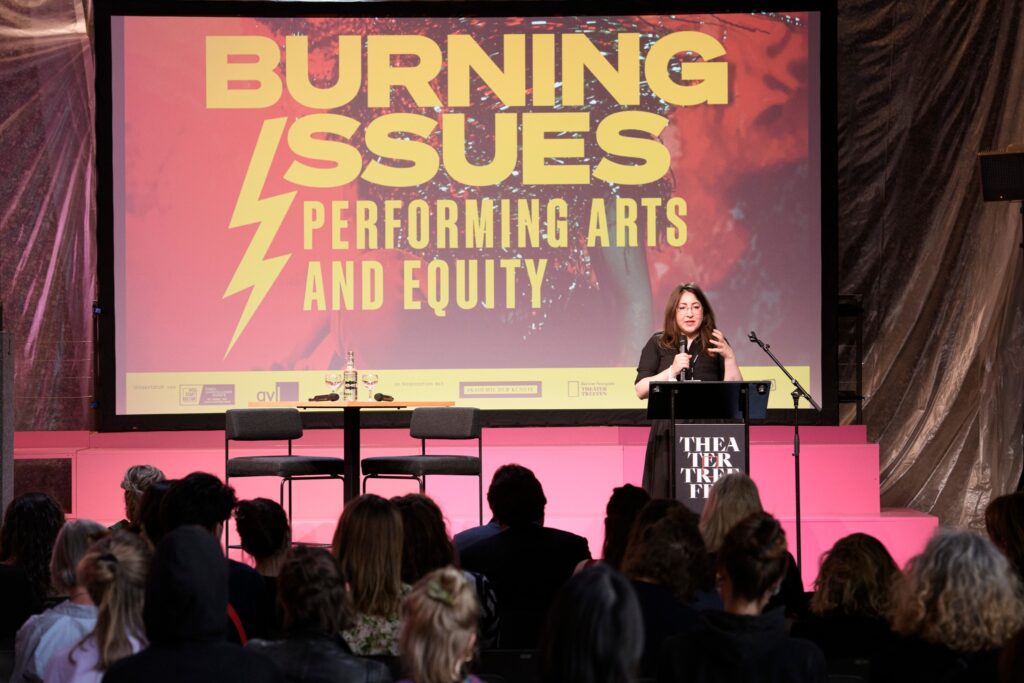Zum zweiten Mal hat die zweitägige Kooperation zwischen Burning Issues und dem Theatertreffen stattgefunden. Autor Ilias Botseas hat die unterschiedlichen Keynotes und Diskussion-Panels zu Diversität, Chancengleichheit und einem gesunden Arbeitsumfeld am zweiten Tag begleitet und zieht ein Fazit – mit einem Appell.
for English version please scroll down
Katie Kheriji-Watts Keynote “I Can’t Believe I Still Have to Protest this Shit” eröffnet den zweiten Burning Issues Tag mit Fragen, bei denen die Hörer:innen die Hand heben sollen, falls sie mit Ja antworten würden:
„Wurden Sie jemals von jemandem in einer Machtposition in einem Arbeits- oder Lernumfeld schikaniert, gedemütigt oder beleidigt?“ – fast alle Hände gehen hoch, meine auch.
„Hat jemand jemals eine sexuelle oder abfällige Bemerkung gemacht, durch die Sie sich unwohl, unwillkommen oder unsicher fühlten?” – wieder schnellen ein Großteil der Hände im Saal hoch.
„Haben Sie sich jemals entschieden, Aggressionen oder subversives Verhalten nicht anzusprechen, weil Sie dachten, es könnte Ihre Karriere gefährden?” – auch hier heben die meisten die Hand.
Es gibt noch einige Fragen dieser Art, die Kheriji-Watts stellen könnte, aber eines haben sie alle gemeinsam:
Es geht um Machtmissbrauch, patriarchale Strukturen und schier unaufbrechbare Hierarchien, die eine opake Kugel bilden. Berichte zu Übergriffigkeiten kommen kaum raus, während marginalisierte Menschengruppen nur schwer eindringen können. Zu hoch ist die Hemmschwelle missbräuchliches Verhalten zu melden, zu wahrscheinlich ist es, den dadurch den eigenen Arbeitsplatz zu gefährden, zu groß ist die Angst vor den Konsequenzen für die eigene Karrierelaufbahn.
In unterschiedlichen Keynotes berichten Diversitätsagent:innen, Museumskurator:innen, Theaterwissenschaftler:innen und viele weitere Sprecher:innen von ihren Erfahrungen an Kulturinstitutionen und benennen die konkreten Faktoren, die den Fortschritt hindern.
In anschließenden Panels diskutieren sie untereinander, werfen Fragen auf, versuchen Lösungsansätze zu finden, sich zu vernetzen und gegenseitig mit Ideen zu befruchten – nutzen die Mannigfaltigkeit ihrer Expertisen und Perspektiven als Chance. Auch Hörer:innen aus dem Plenarsaal der Akademie der Künste, dem Ort der Konferenz, dürfen am Ende Fragen stellen und bei Kaffeepausen und Mittagessen ins Gespräch mit den Sprecher:innen kommen.
Doch was sind die Ergebnisse der Gespräche? Sie sind zum einen ernüchternd und seit Jahren bekannt und zum anderen im Kern simpel: Um toxische Strukturen zu verändern, braucht es viel Engagement, einen langen Atem und vor allem leider den Willen der Personen an der Macht, sich zu bessern und die Institution reformieren. Denn wer sich nicht ändern will, wird sich auch nicht ändern.
Anschließend an Khejiri-Watts Keynote spricht die Autorin und Moderatorin für Prozesse der Konfliktmediation und -heilung Clementine E. Burnley im Diskussionspanel mit Sandrine Micossé-Aikins (Leiterin Diversity Arts Culture, Kuratorin und Equitymanagerin), Ella Steinmann (360°-Agentin am Theater Oberhausen) und Torsten Wöhler (Staatssekretär in der Senatsverwaltung für Kultur und Europa des Landes Berlin) die Problematik mit oberflächlicher Umbesetzung von Machtpositionen an:
Wenn du eine Person in einer Struktur ersetzt, änderst du nicht die Struktur, sondern nur ein Namensschild. Um das grundlegende Problem anzupacken, braucht es die Courage von allen. Das Problem ist nicht deins, du hast es nicht erschaffen, du wirst es nicht beseitigen können. Aber was du tun kannst ist: bei missbräuchlichem Verhalten nicht wegschauen. Eingreifen. Melden. Opfer unterstützen. Täter:innen benennen. Mut haben. Denn niemand will ein Leben lang in einem Unternehmen arbeiten, in dem Angst die Norm ist. Es ist nicht leicht, aber es ist notwendig.
Wie können also die Strukturen nachhaltig verändert und Arbeitsbedingungen verbessert werden?
Mein Fazit: Mit viel Zeit, konstruktiver Dialogbereitschaft und vor allem der Loslösung von der Angst davor, für soziale Gerechtigkeit einzutreten. Mit einfacher Sprache, klarer Kommunikation und einem aktivistischen Selbstverständnis.
Denn eines ist klar – damit ein dauerhafter und sinnvoller Strukturwandel stattfinden kann, reicht es nicht aus, sich nur auf Personen in Machtpositionen zu konzentrieren. Wir müssen alle Aktivist:innen sein. Nicht morgen, nicht übermorgen. Jetzt sofort!
Denn wenn wir nur tatenlos zuschauen, wenn wir keinen Druck aufbauen, werden wir es sicherlich bereuen – vielleicht nicht jetzt, aber morgen.

Cut The Bullshit and Burn The Issues! – We All Have to Be Activists
For the second time, the two-day collaboration between Burning Issues and the Theatertreffen took place. Author Ilias Botseas followed the different keynotes and discussion panels on diversity, equal opportunities and a healthy work environment and draws a conclusion – with an appeal.
On day two, Katie Kheriji-Watts opens her keynote, „I Can’t Believe I Still Have to Protest this Shit,“ with questions that ask listeners to raise their hands if they would answer with yes:
„Have you ever been bullied, humiliated, or insulted by someone in a position of power in a work or learning environment?“ – almost all hands go up, including mine.
„Has anyone ever made a sexual or derogatory comment that made you feel uncomfortable, unwelcome, or unsafe?“ – again, a majority of the hands in the room go up.
„Have you ever chosen not to address aggression or subversive behavior because you thought it might threaten your career?“ – again, most people in the audience raise their hands.
There are several more questions like this that Kheriji-Watts could ask, but they all have one thing in common:
They’re about abuses of power, patriarchal structures and sheer unbreakable hierarchies that form an opaque sphere. Reports of assault hardly ever get out, while marginalized groups of people have a hard time breaking in. The inhibition to report abusive behavior is too high, it is too likely to endanger one’s job as a result, and the fear of the consequences for one’s career is too great.
In various keynotes, diversity agents, museum curators, theater scholars and many other speakers will share their experiences at cultural institutions and identify the specific factors that hinder progress.
In subsequent panels, they discuss among themselves, raise questions, try to find solutions, network and cross-pollinate each other’s ideas – using the diversity of their expertise and perspectives as an opportunity. Listeners from the plenary hall of the Akademie der Künste, the venue of the conference, are also allowed to ask questions at the end and to engage in conversation with the speakers during coffee breaks and lunch.
But what are the results of the talks? On the one hand, they are sobering and have been known for years, and on the other hand, they are simple in their essence: in order to change toxic structures, it takes a lot of commitment, a long time and, above all, unfortunately, the will of the people in power to mend their ways and reform the institution. Because: if you don’t want to change, you won’t change.
Following Khejiri-Watt’s keynote, author and facilitator for processes of conflict mediation and healing Clementine E. Burnley addresses the problem with superficial reshuffling of positions of power in a discussion panel with Sandrine Micossé-Aikins (Director of Diversity Arts Culture, Curator and Equity Manager), Ella Steinmann (360° Agent at Theater Oberhausen) and Torsten Wöhler (State Secretary in the Senate Department for Culture and Europe of the State of Berlin):
When you replace a person in a structure, you don’t change the structure, you just change a name tag. To tackle the fundamental problem, you need the courage of everyone. The problem is not yours, you didn’t create it, you won’t be able to fix it. But what you can do is: when abusive behavior occurs, don’t look the other way. Intervene. Report it. Support victims. Name the perpetrator. Have courage. Because no one wants to spend a lifetime working in a company where fear is the norm. It’s not easy, but it’s necessary.
So how can structures be changed sustainably and working conditions improved?
My conclusion: With a lot of time, a constructive willingness to engage in dialog and, above all, the detachment of fear from standing up for social justice. With simple language, clear communication and an activist self-image.
Because one thing is clear – for lasting and meaningful structural change to take place, it is not enough to focus only on people in positions of power. We all need to be activists. Not tomorrow, not the day after tomorrow. Right now!
Because if we just stand idly by, if we don’t put pressure on, we will certainly regret it – maybe not now, but tomorrow.
